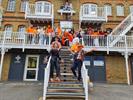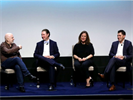Paul Holmes 04 Dec 1990 // 12:00AM GMT
Who says public relations people have no sense of humor? Richard Long, director of corporate communications at Dow Chemical, is certainly not above using a little self deprecating wit to illustrate the predicament the world's found sixth largest chemical years ago.
"It seems there was a wealthy father who had a young son he loved very much," Long says. "When his son's birthday was nearing he asked the little boy what he wanted. The son said he would like a pony, and so the father went out and bought him an Arabian stallion. When the boy got perfect marks in school his father wanted to reward him. The son asked for an electric train. Then, when he completed elementary school, the little boy was asked what he would like for a graduation present. He said he'd like a cowboy outfit. So his father went out and bought Dow Chemical."
For much of the '60s, all of the '70s and the first half of the '80s, Dow Chemical was typecast as the villain, a snarling cattle baron prepared to ride roughshod over any who challenged its actions, threatening and cajoling those whose job it was to enforce the law, careless of any interests but its own. If you were making a movie about Dow, you'd ask Jack Palance to play the lead.
That Rich Long is able to joke about it today is an indication of how far the company has come. While persuading those to whom the name Dow is synonymous with napalm, Agent Orange and dioxin that it is now a company that "lets you do great things" may prove impossible, the company's reputation among journalists and regulators has undergone a major shift.
To understand just how dramatic the change is, it is important to understand the starting point.
"It began in 1966," says Long. "That was when the management of Dow decided to produce napalm. It was a very complicated issue and a very troubled time, but Dow felt it had a patriotic duty to support our government's policy. It was also a very small project for us, a tiny contract, involving only a dozen employees, but it became a major controversy, our first major controversy, and the focus of anti-war demonstrations on college campuses around the country. It turned Dow into a household name."
Prior to that date, Dow had neither sought nor received much attention outside of the chemical industry. Based in Midland, Michigan, the company did not sell directly to consumers, was the dominant economic force in its headquarters area, and—in a pre-regulation era—felt little need to communicate with lawmakers. Public relations was not a priority.
Not surprisingly, Dow's response to criticism was first to ignore it, then to denounce it, and finally to attempt to discredit the source. Equally unsurprisingly, the criticism intensified, with Dow recruiters attacked on campuses and Jane Fonda denouncing the company in a speech at Central Michigan University (an event Dow responded to by canceling its contributions to the college.)
"The attitude was that Dow had been a highly successful company, highly profitable, and that it knew how to handle its business better than anyone in Washington, better than the environmental activists," says John Paluszek, president of Ketchum Public Affairs. Paluszek has worked with Dow for 12 years. "You have to remember that Dow was isolated in the midwest, and that it had more or less avoided contact with the outside world for the better part of a century."
After the napalm protests came reports that the defoliant Agent Orange, contained dioxins that had caused serious cancers in American servicemen and horrifying birth defects in many of their children. Dow defended itself vigorously against the charges when they were first made, and continued to do so through the '70s, claiming that while it had manufactured Agent Orange the government had been responsible for the way it was deployed.
Paul Oreffice, who became the company's CEO on May 3, 1978, was the wrong man at the wrong time. An impressive business strategist, with an excellent track record in Dow's Latin American operations, Oreffice was a combative individual with a tendency to speak first and think later, as well as an almost obsessive opponent of government interference in business—a character trait many colleagues attribute to his childhood experiences of government oppression in Mussolini's Italy. He inherited a PR problem with which he was poorly equipped to deal.
Indeed, Oreffice seemed determined to lead Dow into the center of controversy. He was a vigorous opponent of the Carter administration's "generic cancer policy" for regulating the use of cancer-causing chemicals in the workplace, and of the Superfund legislation designed to clean up hazardous waste sites.
"Oreffice has made his company's battles in the area of health and safety regulation a personal affair," say Ralph Nader and William Taylor in their book The Big Boys. "Oreffice began a one-man crusade on regulatory policy: lecturing to college and civic audiences, cajoling fellow executives, lashing out against the environmental community."
The Oreffice style even attracted criticism from Dow insiders. Long himself admits that his former CEO (Oreffice stepped down in 1987) was "very strong willed, very opinionated, very proud," while former Dow president Herbert Dow Doan says Oreffice's approach was "not as good as it could be publicly. The reason is part ego, part pride. Paul is inclined to push his line to the point where some people say he is arrogant."
Rather than attempt to deal with his company's critics in a spirit of cooperation, Oreffice denounced them, suggesting in a 1978 speech that regulators and environmentalists were saying: "We're not completely sure chemicals are safe, so let's stop making chemicals; we're not completely sure that all foods are safe, so let's stop eating."
In March 1983, events came to a head. Congressman James Scheuer revealed that Dow officials had been allowed to review and edit an EPA report on the health effects of dioxins prior to its release. Paul Oreffice appeared on the Today show, declaring that: "There is absolutely no evidence of dioxin doing any damage to humans except for causing something called chloracne. It's a rash."
Oreffice's statement, characteristically, ignored research showing that minute traces of dioxin caused cancer and assorted birth defects in rats and mice.
The company's arrogance was slimmed up by Dr Samuel Epstein, an expert on cancers in the workplace, who admitted that technologically Dow was well ahead of its competitors in areas such as high temperature incineration of hazardous waste, but that it suffered from an "overwhelming ethos that Dow can do no wrong."
It was at that point, says John Paluszek, that some internal forces at Dow began to argue that the company had to change. "Our first few years working with Dow had been very frustrating," he says. "But we knew the company's reputation had gained concerned a lot of professional communicators, those who were on the front line. If there is an example of how one person can make a difference, even in a corporation the size of Dow, it's Rich Long." Long, who was working in the company's Washington, DC, public relations at the time, lobbied his seniors hard for an internal audit, to find out how employees felt about working for Dow. He was backed by Keith McKennon, another senior communicator who is now president of Dow Chemical USA.
Paul Oreffice, who by that time was spending almost a third of his time responding to press criticism and answering the questions it raised among other audiences, agreed.
The audit found that while almost all of them felt a deep loyalty to the company, they were disturbed about the way their employer was perceived by the outside world. The word that came up more than any other, Long says, was "arrogance." It was clear that employees felt the criticism acutely, and that they expected Dow to do something.
But there were still those who questioned the need for the company to change its way, if only because Dow's problems with the press were having little discernible impact on its business performance.
"We never had a case of a customer ceasing to do business with us because of our problems with napalm or Agent Orange or the environment," Long says. "And it didn't have any impact on our ability to recruit good people. We had always recruited most heavily in the midwest and the southeast, and from chemical engineering or chemistry schools, while most of the protests were coming from the east and from California and from a liberal arts background."
He concedes, however, that many of the company's fiercest critics, the former campus radicals of the '60s, were now editors and Congressional aides and environmentalists.
Besides, Dow was looking to diversify out of chemicals, which it sold largely to other businesses, and into consumer products. It has bought Richardson-Vicks, which produces consumer drugs, and a unit of Morton-Thiokol, which produced such household name items as Fantastik. And if Dow was going to be coming into contact with the consumer it clearly could not afford to go on making enemies the way it had.
If Dow had one "secret weapon" in the battle to turn its reputation around, it was the company's workforce. While Dow's external communications had left much to be desired, its internal communications and its relationship with the community of Midland were excellent. Oreffice himself was a skilled motivator, eating lunch every day in the company cafeteria, listening to what ordinary workers had to say about their jobs and about the company they worked for.
Oreffice had repeatedly refused to use lay-offs as a way to reduce the company's workforce, and berated the nearby auto industry of an "inhuman" approach to labor management.
"The most important thing," says Rich Long, " was to make Dow managers realize that the company's image was not something that should be left to public relations and advertising, that everybody had to be involved, that line managers should consider the PR impact of their decisions, that there had to be a company-wide commitment to turning this thing around."
A task force was set up that included not only communicators but other senior personnel. Long was its chairman, and its overall objective was "to make Dow a more highly regarded company among the people who can influences its future."
For starters, the company installed a toll-free number for media enquiries, and advertised it in journalism trade books. Long admits that the toll-free number was, in part, symbolic of the more open attitude Dow wanted to adopt, but it still attracted around 14,000 media enquiries in its first year.
Since journalistic coverage of science issues was of special interest to Dow, especially since many reporters with minimal scientific background were being assigned to complex scientific stories, the company approached the University of Missouri and suggested the creation of a Science Journalism Center, which was launched in 1986 with funding from Dow, The New York Times, TimesMirror and others.
The company also formed a Management Speech Center, with former chairman Bob Lundeen taking the lead and giving 45 speeches—many to groups that had been openly hostile in the past—in the two years prior to his retirement. Realizing that scientists had greater public credibility than business executives, the company has also funded many educational lectures by science experts.
Not that everyone was suitable for the program Long recalls one manager who, in a company simulation, gave what he portrayed as Dow's views on issues ranging from the Equal Rights Amendment to abortion.
"We realized that there were some people who were never going to be able to think of Dow without thinking about the problems we had in the past," Long admits. "But anyone who could be reached and whose opinion could make a difference, we wanted to reach."
In November 1984, Dow published the first in a series of reports on its "public interest" activities, a glossy brochure which The Big Boys describes as having "all the requisite images of corporate responsibility: smiling children, breakdowns of charitable contributions, pronouncements about the paramount importance of safety in the corporate hierarchy of values."
The program has continued, however, supported by one of the largest corporate advertising campaigns in history—"Dow lets you do great things"—which talks about the company's new environmental concern and its participation in programs such as the corporate "angel" network, which uses company planes to fly sick children around the country for major surgery.
Dow worked with the League of Women Voters on a household hazardous waste program, and with the Sierra Club—another organization critical of the company—to promote federal legislation encouraging waste reduction.
The environmental movement, once described by Paul Oreffice in a speech to the Arizona Business Forum as an "unscrupulous, professional force... fiendishly clever people" has been enlisted as an ally by the new Dow, though in fact the company was one of the first to recognize the potential for profit in recycling chemical waste.
Not that Dow's emergence as a warmer, more caring company has not had its setbacks. Oreffice himself often seemed a grudging participant, complaining after a shareholder vote persuaded the company to pull out of South Africa that: "I think we should have stayed and fought, but sometimes the pressures are just too strong."
Long himself admits that the company suffered a relapse in 1985, when environmental protests outside the Midland plant resulted in the arrest of four activists. The four were given routine blood tests and one was found to have venereal disease (although later tests indicated that this was not the case.) The news was somehow leaked to a Dow official, who called up one of the leading regional activists and made a veiled threat to go public with the information. Instead, the threat was made public and the company was again vilified in the media.
"It was another case of the big bad company putting pressure on an unfortunate individual," says Long. "The public always roots for the underdog and a big corporation is not likely to win hearts and minds by whipping an environmental group made up of genuinely concerned citizens."
That realization, and the action Dow has taken to improve public perception, have dearly had an impact on the way the company acts. Two studies, conducted in 1986 and 1988 by Yankelovich showed a 47% increase in familiarity with Dow, an increase of 128% in positive impressions, and more than 70% of opinion leaders describing Dow as a company concerned about environmental issues.
A separate study by Opinion Research Corp. showed similar findings:,overall favorability increasing almost 50% (reversing an 11 year downward trend) and Dow's social responsibility ratings at an all-time high.
"We know we have plenty of work ahead to improve public perceptions of both Dow and the chemical industry," says Long. "After all, a single negative incident such as a Bhopal or an Exxon Valdez, can undo years of reputation-building. To me, though, it's an irresistible challenge, and I'm proud of the fact that it all started with a candid look at ourselves. We weren't satisfied with what we saw, and we set out to do better."


































.jpg)

















